| Diskografie |
|---|
|
Dave Grohls musikalische Vorgeschichte
|
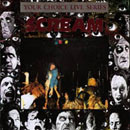 |
Scream "Your Choice Live Series 010" (Your Choice
LP 1990) |
|
live 4.5.1990 in Oberhausen/Deutschland |
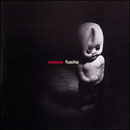 |
Scream "Fumble" (Dischord
Records, Washington DC, LP/CD 1993) 1.Caffeine Dream 2.Sunmaker 3.Mardi Gras 4.Land Torn Down 5.Gods Look Down 6.Crackman 7.Gas 8.Dying Days 9.Poppa Says 10.Rain |
| aufgenommen 12/1989, abgemischt 12/1992, Dave singt auf "Gods Look Down" |
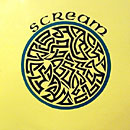 |
Scream "Mardi Gras"
(DSI Records, 7" 1990) 1.Mardi Gras 2.Land Torn Down |
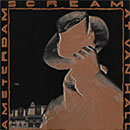 |
Scream "Live At Van Hall
In Amsterdam" (Konkurrel, LP 1989) 1.Who Knows- Who Cares? 2.U Suck A.- We're Fed Up 3.Laissez Faire 4.This Side Up 5.Human Behavior 6.Iron Curtain 7.Total Mash 8.Still Screaming 9.Chokeword 10.Feel Like That 11.Came Without Warning 12.Walk by Myself |
| live am 28.3.88 in der Van Hall, Amsterdam |
 |
Scream "No More Censorship"
(Ras Records, LP 1988) 1.Hit Me 2.No More Censorship 3.Fucked Without a Kiss 4.No Escape 5.Building Dreams 6.Take It from The Top 7.Something in My Head 8.It's About Time 9.Binge 10.Run to the Sun 11.In the Beginning |
| Dave spielt Schlagzeug auf allen Stücken außer auf "Hit Me", singt Chor auf allen Stücken außer auf "Hit Me" und "In the Beginning", das er geschrieben hat |
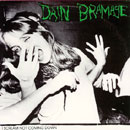 |
Dain Bramage "I Scream Not
Coming Down" (Fartblossom Records, LP 1986?) 1.The Log 2.I Scream Not Coming Down 3.Eyes Open 4.Swear 5.Drag Queen 6.Flannery 7.Stubble 8.Flicker 9.Give It Up 10.Home Sweet Nowhere |
| aufgenommen von Barrett Jones 20.-24.7.1986 in den RK-1 Recording Studios, Crofton, MD |
| Dain Bramage "Cassette Demo
2" 1.Flannery 2.Give It Up 3.The Log 4.Eyes Open 5.Home Sweet Nowhere 6.We're An American Band 7....And There's A... 8.Success 9.Baltimore Sucks (But Booje Needs the Bucks) |
|
| aufgenommen von Barrett Jones 1986 in seinem The Laundry Room-Studio |
| Dain Bramage "Cassette Demo
1" 1.In The Dark 2.Watching It Bake 3.Cheyenne 4.Space Cat 5.Bend |
|
| aufgenommen von Barrett Jones 1986 in seinem The Laundry Room-Studio |
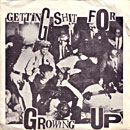 |
Mission Impossible/Lunchmeat "Getting Shit For Growing
Up Differen" (Dischord/Sammich, Split-7" 1985?) |
| die Split-7" von Mission Impossible/Lunchmeat wurde zuerst unter dem Titel "Thanks" mit einem anderem Cover veröffentlicht |
| Mission Impossible (Demos, 1984/85) |
| Freak Baby (Demos, 1984) |
|
"Had a guitar around the house all my life but never got around to really learning how to play it until I was about 10 years old. I was told to take lessons because everyone was sick of hearing 'Smoke On the Water.' Took lessons for about one year and stopped because it wasn't teaching me how to play music. About the same time I was trying to figure out Beatles songs by myself. I was always really good at figuring out songs by ear. I always thought that it was in my blood, seeing as my mohter was in singing goups as a teen and my father was an accomplished flautist. At 11, I started recording songs on a Fairfax County Public School issue cassete player with my best friend, Larry Hinkle. My first elctric guitar was a Silvertone (the cool kind from the '60s with the amp built into the case) that I got for Christmas at age 12. By spring it was dropped and broken. It was replaced by a Memphis Les Paul copy. Black. Soon I discovered distortion and joined a neighborhood cover band. Played Who, Stones, etc. Actually performed at a nursing home and played "This Is On My Side." People danced. On the summer of my 13th year, my family took its annual trip to Evanston, Illinois to visit my cousins. Upon arrival, I was greeted at the front door by my cousin, Tracey. But this wasn't the Tracey I had grown to love, this was punk Tracey. Complete with bondage pants, spiked hair, chains, the whole nine yards. It was the most fucking awsome thing I had ever seen. That few weeks in Evanston changed my life forever. I was totally amaxed at the extensive underground of fanzines and lables and bands. Her record collection (worth a mint today, I'm sure) was incredible! Hundreds of singles from all over the world. I no longer thought that punk rockers existed only on 'CHIPS' and 'Quincy.' It was especially moving seeing my first show (Naked Raygun/R.O.T.A. at the Cubby Bear, summer 1982), having never been to a rock concert before in my life. To me, this was what rock concert was really like until I saw my first "real" concert at age 19. Needless to say, it was quite a dissapointment (the big concert, silly). In the summer of 1984 I met some guys at a Void show in D.C. who were in a band that needed a guitar player. I gladly offered my services and was given an audition. The band was called Freak Baby. I was accepted and my career as a punk rocker began. We played a few shows at a local high school and recorded a demo that fall with local studio wiz Barrett Jones. This was my first recording in a real deal 4 track studio. We convinced the local punk rock record store, Smash, to sell our cassettes and managed to gain of following of four or five local skinheads. Go figure. After kicking out our bass player a few months later, I had the chance to put down the guitar and rescue the drums from our struggling drummer, Dave. Turns out he was actually a rather fine bass player to begin with, making the decision even more logical (or palatable). Enter Mission Impossible Mission Impossible was a super-fast hardcore delight-- a chance to try out all the tricks that I had learned from my growing record collection, on a real drumset even! I hadn't the slightest idea how to set the fucking thing up, but I sure loved beating the shit out of it. We actually wrote songs that had little breaks in them so we could jump just like the pictures we'd seen in Maximumrocknroll and Flipside. It was 1985 and I was living my hardcore dream. Mission Impossible played its last show in the summer of 1985. Over the couse of a year, I'd had many great experiences:opening for the legendary Troublefunk at a high shcool prom, Ian Mackaye publicly declairing that he liked my band, finally being able to send demo tapes to pen pals I'd aquired over the years of fanzine collecting, even releasing a split single with local heoroes Lunchmead (now Girls Against Boys). Enter Ruben Radding, an extraodinary bassist in band called A.O.C. that had just broked up as well. His knowledge of hardcore was neligible, his taste being more in the Mission of Burma/Television vein. We set up our stuff in my living room and smoked a whole bunch of pot, wrote four songs, and Dain Bramage was born. With Reuben on guitar and vocals, Dave (ex-Mission Impossible) on bass, and me still at the drum set, we started writing song after song at an alarming pace. We started playing shows around town, whenever we could get them, usually to the hardcore kids' dismay. This band was where I really started to utilize my growing interest in songwriting: arrangment, dynamics, different tunings, etc. We were extremely experimental, usually experimenting with classic rock clishes in a noisy, punk rock kind of way. Like every other band I'd been in, we eventually recorded a few demos with Barrett. After Fartblossom, much to our surprise. Flattered beyond belief, we went into a 24 track studio near Annapolis and recorded Dain Bramage's only LP, I Scream Not Coming Down. It was a fine demonstration of our blend of rock, art punk, and hardcore. I still like it. A year or so later, I saw a flyer that read 'Scream looking for drummer, call Franz.' Now, Scream was legendary in D.C.. They had been a band since 1979 or '80 and I had seen them many a time. Their first two records were among my all-time favorites, so this little flyer was more than just that. Originally, I'd just wanted to call Franz, jam with them once or twice, then be able to tell my friends 'I got to play with Scream!!'. So I called Franz a few times and finally got an answer. I explained that I was a huge fan, told him which bands I'd played in, and that I'd love to give it a shot. When he asked how old I was, I lied and said I was 20 (I think I was 17). He never called back. I guess a few months went by and I called him again. This time I convinced him to give me an hour or two of his time and scheduled my audition. Seeing as how Scream records were among those I used to play drums to on my bed when I was first learning, I knew all their songs by heart. I even had an advance copy of their latest demo. So when Franz looked at me and asked, 'What do you want to play? Some Sabbath? Or some Zep?' I said, 'Nah. let's play...' and rattled off the names of all their songs. The next two hours were heaven for me, to be able to play Scream songs with the real deal. After a few more practices, it was apparent they were serious about me joining. This was something that never entered my mind, the possibility of actually joining Scream. I had to really weigh the options: 1. Leave my two greatest friends in the dust and travel the world with one of my favorite bands ever. Or 2. Stick with Dain Bramage and hope it all works out. I called Franz and told him no. I explained my situation and apologized. I think he understood and invited me to their next show a few weeks later. It was one of the greatest Scream shows I'd ever seen. I changed my mind. It was spring of '87 and here I was in one of D.C.'s most respected bands. Scream was no longer making records for Dischord, but another D.C. label had signed us. Ras Records was a reggae label about to try (unsuccessfully) to expand into the rock market. So we were thrown into a fancy 24 track studio with a reggae producer to make No More Censorship, Scream's fourth LP. We set out on what would be our first American tour in the fall of 1987. I was 18 years old, doing exactly what I wanted to do. With a $7 a day per diem, I traveled to places I'd never dreamed of visiting. And all because of music. The feeling of driving across the country in a van with five other guys, stopping in every city to play, sleeping on peoples' floors, watching the sun come up over the desert as I drove, it was all too much. This was definitely where I belonged. My first trip to Europe was amazing. In February of 1988, we flew into Amsterdam and spent the next two months playing in the Netherlands, France, Germany, Italy, Scandinavia, England and Spain. Most shows were in squats (buildings taken over by punks at war with the system, fighting the police for their right to a place to live) and youth centers, very few in bars or nightclubs. It was awesome. Most shows were actually pretty crowded since Scream was one of the few American hardcore bands to visit Europe before. We did another short U.S. tour, returned to Europe in the fall for three months, recorded a live record (Live At Van Hall In Amsterdam), and continued writing new songs. This was also the year I attended my first big stadium concert, Monsters of Rock featuring Metallica, Van Halen, Dokken, Scorpions, etc., etc. Needless to say, I found the whole thing extremely comical and couldn't for the life of me understand the appeal of something so contrived and phony. Good thing I would never have to do that. In between Scream tours, I was hanging out with Barrett more and more, helping him out with his solo project in the studio. Since he had his own 8 track in the basement, we would jam on his songs and record them pretty quickly. I sometimes played bass or guitar on some songs. That summer I realized that if I were to write a song, record the drums first, then come back over it with a few guitars, bass, and vocals, I could make it sound like a band. So I came up with a few riffs on the spot and recorded three songs in under 15 minutes. Mind you, these were no epic masterpieces, just a test to see if I could do this sort of thing on my own. It was the beginning of a beautiful relationship. I then started writing more and more stuff, some used in Scream's final tape (later released as Fumble), some hidden away for later use. We did our final tour of Europe in the spring of 1990. It was a real ballbuster, 23 shows in 24 days, so draining that one member quit 3/4 of the way through, only to be promptly replaced so that we could finish the tour. We recorded another live record (Live In Germany) and headed home. Upon returning, an eviction notice was discovered, unopened, in (Scream vocalist) Pete Stahl and (bassist) Skeeter's mailbox. It was for the next day. The only logical thing to do: Get back on the road. So we booked what would be our last tour, rather hastily, and hit the road in the summer of '90. Plagued with cancellations and low attendance, it was apparent that something had to give. That something would be our bassist Skeeter. Upon waking up in Franz's sister's house in L.A. halfway through the tour and discovering that Skeeter was gone, we realized some heavy decisions had to be made. Suckers for punishment that we were, we decided to stay in L.A. and search for a new bassist. After I explained our predicament to him, Buzz Osborne from the Melvins told me that this band called Nirvana was looking for a drummer. He said they'd seen Scream in S.F. and really liked my drumming. After waiting a few days, I gathered up enough courage to call this guy Chris. I introduced myself and he remembered seeing me play. I explained my situation and he told me that they had already recruited Mudhoney drummer Dan Peters and that they were practicing with him for an upcoming UK tour. I wished him luck and told him that if they were ever in L.A. (which was looking more and more like my permanent home) to give me a call. Chris called back that night and asked if there was any way I could fly up to Seattle. Another heartbreaking decision: Was I to leave my best friends in the world, the ones who had taught me everything I knew about touring, playing, writing, living, etc. to move to Seattle and join a band full of people I had never even met? It was the toughest decision I ever had to make. Honestly, 100%. I got the hell out of L.A. and there was no looking back. With only my drum set in a huge box and a bag of clothes, I was greeted at the Seattle airport by the biggest guy I had ever seen and the scrawniest guy I had ever seen. After a brief run through of the songs on Bleach a few days later, it was clear that this was my new position." Dave Grohl: "On my trips back to Va., I started recording more and more at Barrett's studio. I had probably finished six or seven songs and was writing a lot of stuff in my spare time in Olympia. After recording Nevermind, I went home for a few days and recorded at a different local D.C. studio. This tape was heard by a friend named Jenny Toomey who had a label called Simple Machines. She had heard other recordings and asked if I was interested in doing a cassette release. I was a little hesitant, always having been very shy about people listening to me sing, but I eventually said yes. This was to become my alter ego, "Late." The cassette was entitled Pocketwatch and was (and still is) duplicated from a second generation copy that I had given Jenny months before and included early versions of "Winnebago" and "Marigold" (later Nirvana B-side). The explosion of my real band kept me pretty busy for a while, but I always managed to bring along a guitar so that I could write songs to record upon returning home. By this time, Barrett had moved to Seattle and become my roommate. The 8 track studio was in the basement, at our disposal anytime we came up with an idea. This is where I really started to focus on my songs. After touring America and Europe for Nevermind, we had some time to relax. It was my time to get to work downstairs. "Alone & Easy Target," "Floaty" and maybe 10-15 others were recorded there. Then it was back on the road with the N-band. The summer of 1992 was a blast. With little action on the Nirvana front, I could pay more attention to my music. The studio was moved to a different location, as were we, and recording became a full time deal. Between sporadic Nirvana trips and visits to D.C., most of my time was spent writing and experimenting with harmonies and arrangements. Songs like "Good Grief" and "Exhausted" were written around this time. "Weenie Beenie" and "Podunk" were thrown together in early 1993, as were lots of other songs I sure hope no one ever hears. "For All The Cows" was done around the same time, and my growing love of recording cover songs led me to record "Ozone" from Ace Frehley's solo record and the Angry Samoans' "Gas Chamber." Around the summer of 1993, I had been talking to a fellow in Detroit about possibly releasing some of my stuff on his small label. I wanted to remain anonymous, but ultimately have something to send to friends and stuff. Nirvana's upcoming tour put that stuff on the back burner, but I was genuinely looking forward to pursuing it once the band had some time off. After Kurt's death, I was about as confused as I've ever been. To continue almost seemed in vain. I was always going to be 'that guy from Kurt Cobain's band' and I knew that. I wasn't even sure if I had the desire to make music anymore. I received a postcard from fellow Seattle band 7 Year Bitch, who had also lost a member. It said, 'We know what you're going through. The desire to play music is gone for now, but it will return. Don't worry." That fucking letter saved my life, because as much as I missed Kurt, and as much as I felt so lost, I knew that there was only one thing that I was truly cut out to do and that was music. I know that sounds so incredibly corny, but I honestly felt that. I decided to do what I had always wanted to do since the first time I'd recorded a song all by myself. I was going to book a week in a 24 track studio, choose the best stuff I'd ever written out of the 30-40 songs that had piled up, and really concentrate on them in a real studio. So I booked time at the studio down the street and got my shit together. The first four hours was spent getting sounds. This was a cinch for Barrett, whom I'd asked to produce since he was the one person in the world I felt comfortable singing in front of. By five o'clock we were ready to record. Over the past six years, Barrett and I had perfected our own method of recording. Start with drums, listen to playback while humming tune in head to make sure arrangement is correct, put down two or three guitar tracks--Mind you, all amplifiers and everything are ready to go before recording begins--Do bass track and move on to next songs, saving vocals for last. This time, though, it became sort of a game. I wanted to see how little time it could take me to track 15 songs, complete with overdubs and everything. I did the basic tracks in two and a half days, meaning I was literally running from instrument to instrument, using mostly first takes on everything. All vocals and rough mixes were finished on schedule: one week. Then the question of what to do with it. I made my first mistake: my trip to the duplication lab downtown for 100 copies. My next mistake was my blind generosity. That fucking tape spread like the Ebola virus, leaving me with an answering machine tape full of record company jive." I jammed around with a few people before meeting Nate Mendel. His girlfriend was a good friend of my wife, and they joined us for a Thanksgiving party at my house. It was the night we discovered my house was haunted, but that's a different story altogether. Not long after meeting Nate, I gave a tape to Pat Smear. I knew that the band would need two guitars, but didn't think that Pat would want to commit to anything (or that he would even like the music). To my surprise, not only did he like the tape, he expressed interest in joining up. I just wanted to find the perfect drummer. Enter William Goldsmith. Will was in Nate's band, Sunny Day Real Estate. The band had become extremely popular in Seattle and had an album out on Sub Pop. Though I had never seen or heard them, I knew a little about them. I saw them play their last few shows in Seattle and was blown away by Nate and Will. So you can imagine my first reaction when I heard the band was calling it quits. I gave the two of them tapes through my wife's friend and prayed they'd enjoy them. I didn't want this to be some ridiculous solo project. I sure as fuck didn't consider Pat, Nate and William my backing band. I realized this was a bizarre foundation for a band, but that's exactly what my goal was: To have another band. We got together and it was soon apparent that this was to be that next band. I wanted everyone to have the freedom to do whatever they wanted to do within the songs, each member as important as the next." gefunden bei " |
| © 2000-2002 information overload - All rights reserved! / Copyright 2000-2002 Martin Fuchs - Alle Rechte vorbehalten! |